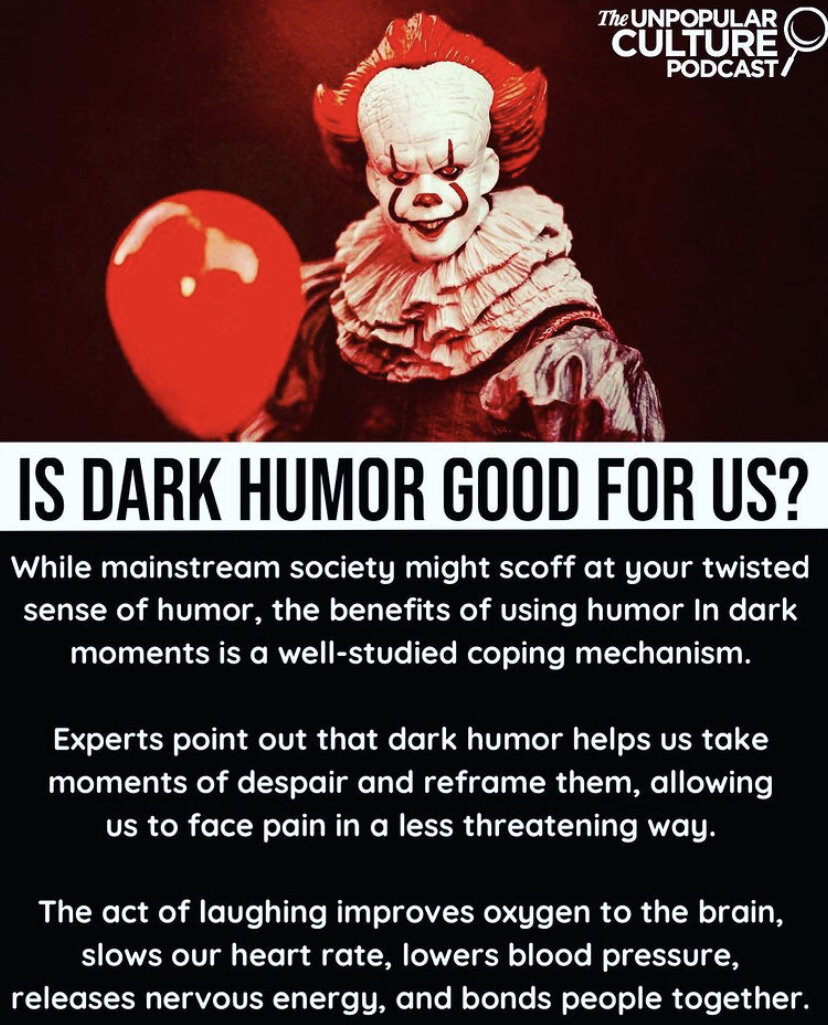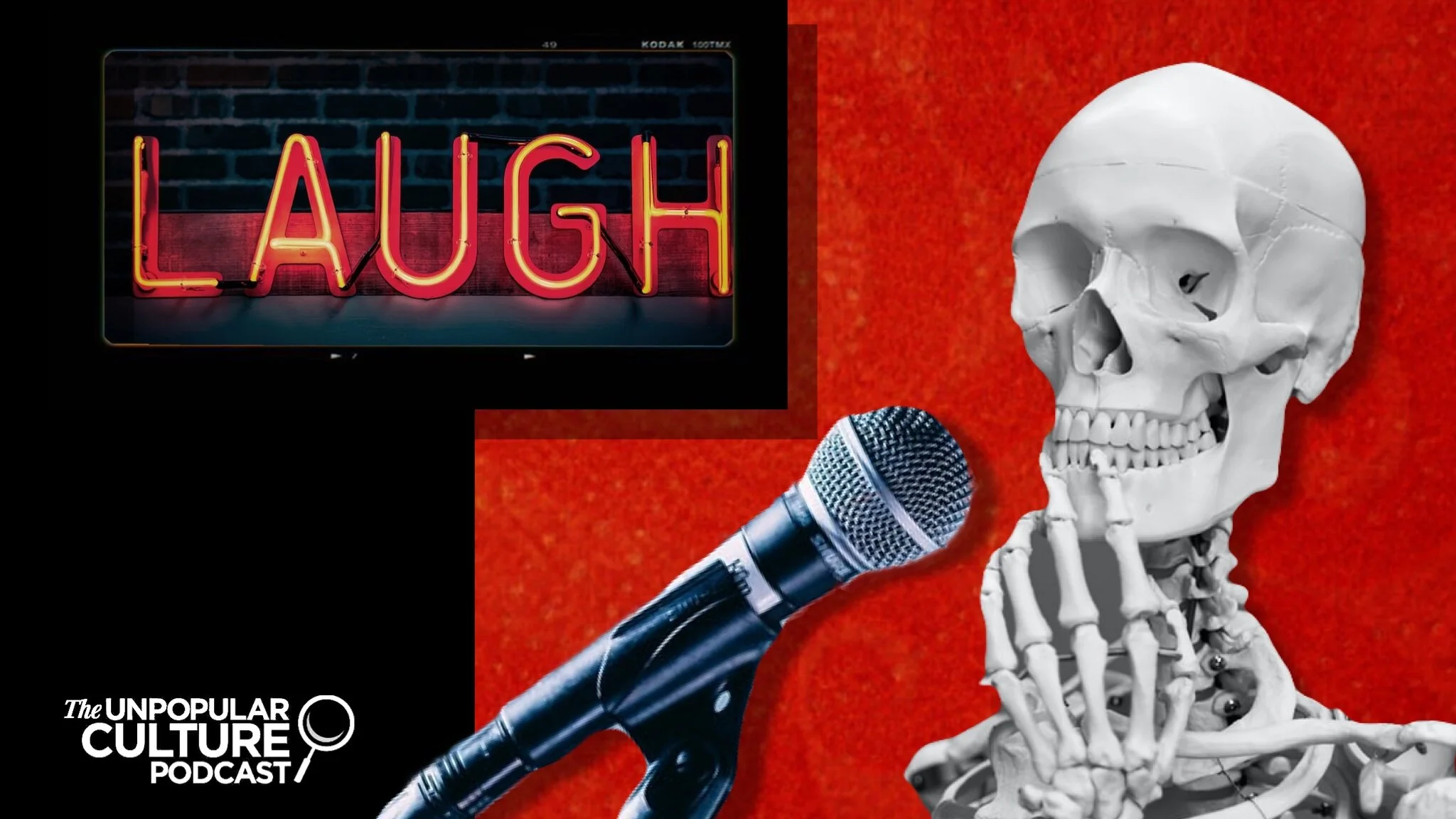👇Watch Below👇
What’s the worst thing you can say to someone in grief?
In this week's episode, Professor Michael Drane meets with Tawny Platis, Host of 'Death Is Hilarious' Podcast, to explore the Psychology of Dark Humor.
Listen in as they discuss what dark humor is, why it's good for us, how Covid-19 has impacted our sense of humor, and what having a dark sense of humor says about our personality. They also explore the misconceptions and frustrations with Kubler-Ross's model for grief, as well as the kinds of things you should and should not say to a person who has suffered a traumatic loss.
This episode is reserved for our beloved Stalkers of the Podcast, but we gave ya'll a sneak peek so you know what you'd be missing out on. ;)
Stay safe out there friends, and we hope you enjoy the show.
You can check out Tawny and Sam’s Podcast at:
Website: www.deathishilarious.com
Instagram: @thatdeathpod
Twitter: @thatdeathpod
Show Notes
There is a strong chance that if you are reading this, you have experienced loss in one form or another. Some of us have lost our dream jobs, a partner, a parent, or even a pet. These experiences can leave us feeling like we have a giant hole in our sense of identity—we don’t even know who we are anymore without that person.
Humans are extremely resilient. We learn to cope with grief in a myriad of ways, but my personal favorite is dark humor. Dark humor is an interesting concept—laughing at death is not for everyone, but dark humor is an incredibly resilient coping method. We see this best with stand-up comedians who tell jokes about loss in order to cope with the pain. So, what is dark humor? Why do we use it, and what does its use say about us?
Dark Humor
Dark Humor, aka Black Humor, is best described as the kind of humor that treats threatening or disturbing subjects with a lightheartedness or enjoyment. This type of humor is typically employed to convey the absurdity, illogicality, or helplessness of a situation. This is because humor is a stress moderator. Creating humor around a stressful situation can result in a reduced physiological stress response, less emotional stress overall, and it can lower negative emotions. This is also known as Cognitive Reappraisal. As mentioned, it is a highly effective emotion regulation strategy that allows a person to take a negative event or experience and reconsider it from a less threatening point of view. In turn, this allows the person experiencing the negative event to look directly at what is painful and interpret it in a less harmful or less threatening way. Of course, laughing plays a key role in this as well! The act of laughing in and of itself improves oxygen consumption and can even slow the heart rate, which results in reduced blood pressure. This is due to the changes in the body’s endocrine system. Laughter is a beautiful mechanism because it serves as a release for our body’s nervous energy, and it can even promote group cohesion.
During our episode, Tawny and I reviewed some work by Willinger et al., (2017). Their study focused on ways to find distinctive groups of subjects in terms of how they processed dark humor, their intellectual capacities, their mood disturbance and their aggressiveness. 156 adults were asked to rate dark humor cartoons using measurements like verbal and nonverbal intelligence, mood disturbance and aggressiveness. Results indicated that there are 3 types of groups when it comes to dark humor:
1) Moderate preference for dark humor with moderate comprehension
2) Low preference for dark humor with moderate comprehension
3) High preference for dark humor with high comprehension
Dark Humor and Covid-19
What’s even more interesting is how these results play into our not-so-recent collective experience with Covid-19. Dr. Paolo Canal, Dr. Luca Bischetti and Dr. Valentina Bambini collected data 2 weeks into Italy’s nationwide lockdown. The participants were asked to rate jokes on a 7-point scale for how disturbing it was. (0 = not at all disturbing; 6 = very disturbing), as well as for funniness (0 = not at all funny; 6 = very funny). They were also asked to take a brief personality assessment and filled out some minor demographic information.
Results indicated that while Covid and non-Covid humor were equally funny, Covid jokes were perceived as being far more disturbing when compared to other forms of dark humor (i.e., dead baby jokes). Additionally, physical distance and perceived risk played a large influence—those who perceived their risk of contracting Covid-19 to be greater found the Covid jokes to be more disturbing, whereas those who perceived their risk of contracting Covid-19 lower found Covid related humor to be funnier. The further away the participants were from the major epicenters of the contagion, the funnier the jokes were. Even more, the more optimistic someone was, the more likely they found the Covid jokes humorous.
Models for Grieving
Some of us have unfortunately experienced the tragedy of losing a loved one to Covid-19. My own family has been impacted by this disease, as have many of my friends. When we are in the throws of grief, it can feel like there will never be an end. In some ways, that loss will stay with you forever. The pain might lessen over time, but it never truly leaves us. But we learn to do the best we can with what we have, and we eventually accept what has happened. Elisabeth Kübler-Ross is well known for her model on grief—the 5 Stages of Grief. As Tawny and I discussed, however, this model does not fit everyone’s experience.
A common misconception is that humans simply pass through each of these stages as if they are a chapter of sorts. We start one, we move onto the next. But if you have lost someone, you may already know that grief doesn’t feel like this.
The five stages are as follows:
1. Denial
2. Anger
3. Bargaining
4. Depression
5. Acceptance
As we move through grief, we can return to each of these phases in several ways. One day you might feel like you are no longer in denial, and then all of a sudden, a song comes on that reminds you of your person, and you’re right back to “I can’t believe they’re gone”. Even more, we can be in multiple stages of grief at once. We can feel angry and depressed at the same time. We can scream at the heavens for taking the one we loved, bargaining with a higher power, and then fall right back into depression. Everyone’s experience is different, which is why it is so important to be compassionate and open to others. We cannot know another’s experience, truly, even if we think we know that person very well, because we are not them—we are not living in their bodies, we are not sharing the same brain.
British Psychiatrist Colin Murray Parkes developed a model of grief based on Bowlby’s theory of attachment, and I think this is a better place to start:
Shock and numbness: Loss in this phase feels impossible to accept.
Similar to Kübler-Ross's stage of denial, we are overwhelmed when trying to cope with our emotions.
Parkes suggests that there is physical distress experienced in this phase as well, which can lead to somatic (physical) symptoms.
Yearning and searching: As we process loss in this phase, we may begin to look for comfort to fill the void our loved one has left.
Reliving memories through pictures
looking for signs from the person to feel connected to them.
In this phase, we become very preoccupied with the person we have lost.
Despair and disorganization: We may find ourselves questioning and feeling angry in this phase.
The realization that our loved one is not returning feels real, and we can have a difficult time understanding or finding hope in our future.
We may feel directionless in this phase
Might make drastic life changes
Disconnect from people
Connect with new relationships
Reorganization and recovery: In this phase, we feel more hopeful that our hearts and minds can be restored.
Similar to Kübler-Ross's acceptance stage, sadness or longing for our loved one doesn't disappear.
However, we move towards healing and reconnecting with others for support, finding small ways to reestablish some normalcy in our daily lives.
Tawny and I discussed this at depth, and in turn, how those who are uncomfortable with another’s grief can unintentionally make insensitive comments. Below is a list of things that you should definitely NOT say to someone in grief, and below that is a list by the New York Times of what to say (and not to say) to someone who’s grieving.
The Worst Things to Say to Someone in Grief
1. At least she lived a long life, many people die young
2. He is in a better place
3. She brought this on herself
4. There is a reason for everything
5. Aren’t you over him yet, he has been dead for a while now
6. You can have another child still
7. She was such a good person God wanted her to be with him
8. I know how you feel
9. She did what she came here to do and it was her time to go
10. Be strong
New York Times
“What to Say (and What Not to Say) to Someone Who’s Grieving” (Feb 2019)
· “After our daughter was stillborn,” wrote Wendy Thomas, “a colleague told me I shouldn’t have used the photocopy machine.”
· “My first husband died of cancer when he was 35 and I was 26,” recounted Patrice Werner. “I still recoil when I think of the number of people who said, ‘You’re young; you’ll find someone else.’”
· “My only child, Jesse, committed suicide at age 30,” Valerie P. Cohen recalled. “A friend wrote, ‘I know exactly how you feel, because my dog just died.’”
· “Oh my God, I could never handle what you are going through!” (Costanza-Chavez’s mental reply, “Yes. Yes you could. You just do. And, you would. Don’t further isolate me with your own projecting.”)
· “I didn’t call because I figured you wanted to be alone.” (Her: “Even if I did, you should always call, write, email, or text.”)
· “I didn’t visit because I hate hospitals. I don’t do hospitals.” (Her: “No one likes hospitals, no one, unless perhaps you are visiting a new baby. Do it anyway.”)
· “I’m so sorry for your loss to lung cancer. Did he smoke?” Or, if it was a heart attack, “Was she overweight?” (Her: “You are just trying to find reassurance that this scary, scary thing won’t happen to you. Stop it.”)
References
https://www.verywellmind.com/five-stages-of-grief-4175361#additional-models
https://www.psychologytoday.com/us/blog/the-debrief/201805/awful-joke-can-feel-pretty-good
https://www.ncbi.nlm.nih.gov/pmc/articles/PMC5383683/
https://grief.com/10-best-worst-things-to-say-to-someone-in-grief/
Death is Hilarious Podcast
The show that explores using dark humor to cope with grief, loss, and trauma.
HELP SUPPORT THE SHOW BELOW
Unpopular Culture Podcast is a psychology podcast hosted by Professor & Psychotherapist Michael Drane. With help from professionals in different fields, he seeks to shine light into the broken underbelly of society.
Listen as he takes on the psychology behind subjects like:
True Crime: serial killers, murders, stalkers, cults, forensic analysis
Psychology: mental illness, social phenomenon, mob mentality, psychoanalysis, etc.
Culture: Sexuality, Satanic Panic, love, Tv analysis, movie analysis.
We are an independent psychology podcast. Help us keep UPC free of ads and on the air. Please consider supporting the show and get access to our "Stalkers Only" archive, and help be a part of the creative process.
Support the Show! —> patreon.com/upcpodcast
YOU CAN FOLLOW US HERE OR ANYWHERE YOU FIND AWESOME PODCASTS
SPOTIFY
ITUNES
STITCHER
PLAYERFM
IHEARTRADIO
👇Listen Below👇






